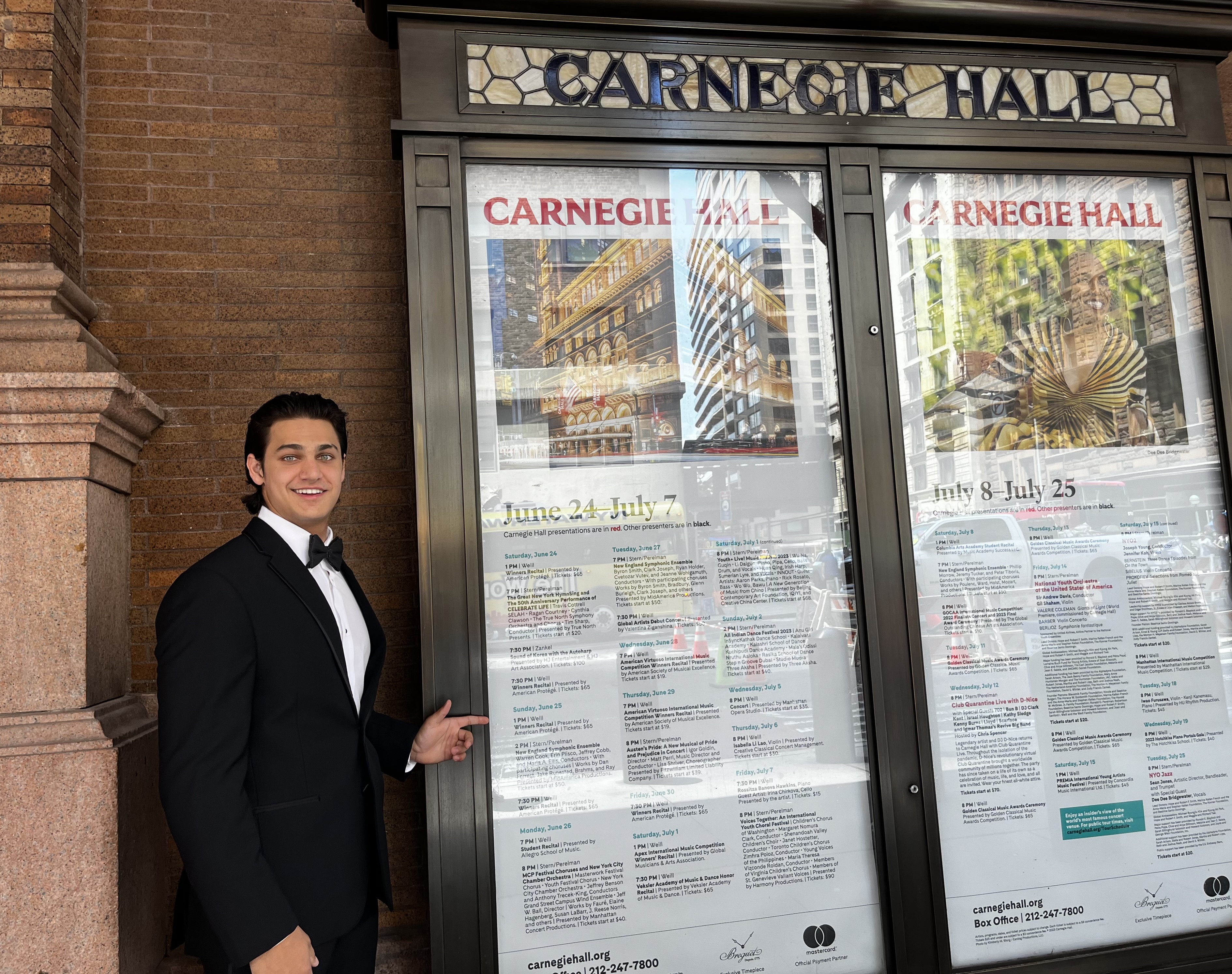From Space Coast to Carnegie Hall: Valedictorian Shares Musical Triumph
Kiran Dhruv Shay had been playing piano since age 5. The more time he spent tickling the ivories, the more enamored he became with the idea of playing at Carnegie Hall.
At 17, he found an opportunity to turn that “maybe someday” into an actual date on the calendar and submitted a video of himself playing to American Protege, an international piano and strings competition. Kiran donned his suit and tie, enlisted his mom’s help with recording, and played Prelude in C Major by Heinrich Klassen.
The piece is showy and physically demanding, requiring the right hand to play a flutter of notes consistently. The margin for error is high, and when you’re a perfectionist like Kiran, that’s a recipe for a long piano session.
“After every try, there was one small thing that I noticed where I was like, ‘Oh, I messed that up; I’m going to have to redo it,’” he said. “After two and a half hours, I was getting hot, I started really messing up a lot, and my arms were getting tired. I was like, ‘I can’t keep doing this; one of these takes has to be good.’ So I spent another hour listening to the takes, and guess what? The first one was the best! I submitted it but wasn’t confident they would choose me.”
Well, they did choose him. Kiran would have to face “Prelude in C Major” and the pressure of perfectionism on one of the biggest stages in the world.
Raising Kiran
Dr. Nikhita Dhruv emigrated from India to the U.S. in the 1970s as a young child, along with her family. The Dhruvs moved a lot and experienced discrimination and ostracization. Dhruv and her sister relied on their mother for a sense of stability and self-confidence in an environment that threatened to tear them down.
“She invested everything in raising us,” Dhruv said. “She had an attitude that, ‘My whole life is these children,’ and so I took my approach to parenting from her.”
Dhruv raised Kiran as a single mother, and they approached life as a team. She would bring him to her work when she had to, and from a young age, he learned to pitch in with chores at home. He grew into a warm, affable, humble, and helpful young man who also throws himself wholeheartedly into everything he does.
“My friends point out that he probably learned his perfectionism from me,” admitted Dhruv, “but I don’t put pressure on him. His psychological well-being is so much more important to me than any accomplishments. Still, once he sets a goal, he pushes himself. That’s just who he is.”
One of Dhruv’s strategies in raising Kiran was exposing him to as many different things as possible. That open-mindedness melds with her son’s natural doggedness to create an alchemy of remarkable accomplishments.
For example, Dhruv wanted to expose him to concepts beyond his school curriculum, so she signed him up for Kumon, an after-school program. Then 10-year-old Kiran would study the 30-minute math and reading lessons for hours until he got it right. A year later, he delivered a speech to thousands of attendees at the company’s North American conference after helping to design and 3D print a prosthetic hand.
Kiran’s relationship with piano playing has developed much the same way. Dhruv heard about a nearby piano instructor, so she signed him up. He had a great affirming relationship with that teacher. Still, she encouraged him to switch instructors to hone his skills further. His new instructor was a real stickler.
“She rarely had a positive word for his playing,” Dhruv said. “I worried about the impact that could have on a young child’s psyche, and I would ask if he wanted to return to his old teacher. But he said no, he wanted to stick with it.”
He stuck with it all the way to Carnegie Hall. That accomplishment was only one feather in Kiran’s cap. He also scored the highest on every advanced placement test he took, earned status as a National Merit Scholar, and is valedictorian of the Holy Trinity Episcopal Academy Class of 2023.
One could imagine Dhruv positioning herself as social media’s next big parenting influencer. Instead, she makes it clear where Kiran gets his endearing humility.
“I don’t know! I don’t know anything about parenting. I’m really just winging it,” she said.
The New York Trip
When Kiran learned he had been accepted to play at Carnegie Hall, he’d developed a love-hate relationship with “Prelude in C Major.”
“I don’t even like this piece very much,” he said. “It sounds really cool. It’s fun to play. But the room for error is so high. Plus, I started to prefer slow melodic Chopin-type pieces as I got older. I found it tiring, and I was just ready to retire it. So when I found out I was selected, my initial reaction was, ‘Oh my gosh, this is so sick! I’m so excited!’ Then, ‘Dang it! I really have to play this piece again.’”
He took a break from the piece until about three months before the recital, then muscle memory kicked in, and it was as if he’d never stopped playing it. By the time Kiran and his mom boarded the flight to New York, Kiran felt comfortable with the piece. The mother and son spent a whole day soaking in New York, including Times Square. But after more than 24 hours away from home, his fingers started itching for the ivories, so they capped the eve of the recital by renting an hour with a piano at a music shop near Carnegie Hall for last-minute practice.
The big performance took place on Sunday, June 25, 2023. Kiran said he appeared calm and collected, but he was actually a nervous wreck. The specific story of the performance is best experienced by hearing Kiran tell it: watch here.
Needless to say, Kiran was more nervous than any other lead-up to a performance. So much so he had to lie to himself a little bit to get through it.
“I’ve played at countless local recitals,” Kiran said, “And even when I find a piano in a public setting like a hotel, I’ll sit and play. I like playing for people; that doesn’t really bother me. So when I was walking out onto the stage at Carnegie, I was trying to put my head in that frame of mind, telling myself it was no big deal — just another performance. It wasn’t until I finished and took a bow that I could really take in the magnitude of what had just happened.”
Still, he performed so beautifully that, according to Dhruv, out of dozens of performers, members of the audience were raving about his piece. That moment solidified her son’s accomplishment for Dhruv, who admits she knows almost nothing about music.
“It was great seeing him, but I’ve seen him on so many different stages that it didn’t fully hit me until I overheard random people gushing over his performance. They didn’t know I was his mother, but they were saying, ‘Oh my god, did you hear him play?!’”

Paging the Next Dr. Dhruv
Kiran said he had always considered pursuing music as more than a hobby until he talked to friends who were making a career out of it. They explained relying on your passion for a paycheck creates added stress. For Kiran, that defeats the purpose.
“Playing piano is so important to me as a stress reliever,” he said. “Whenever I’m not having a good day, playing the piano makes me feel so much better. I don’t want what makes me feel so much better to turn into a stress inducer.”
So Kiran will keep playing piano for at least 30 minutes every day and keep performing to brighten people’s day, but to fill out his resumé, he plans to follow in his mother’s footsteps and pursue medicine. He will be attending Johns Hopkins University in the fall and studying neuroscience.
“They have a conservatory at Johns Hopkins,” he explained. “I’m thinking about maybe taking a couple of classes, some music theory, and potentially joining some music groups. Music is part of who I am; I will always incorporate it somehow.”
Lessons Learned
Kiran was enamored with the idea of playing at Carnegie Hall. But it was much in the same way a child laying on the grass staring up at the clouds dreams of flying, a fantasy you never genuinely expect to turn into reality.
“I honestly didn’t think I would ever play at Carnegie Hall,” Kiran said. “The people I knew who performed there, I heard the pieces they played, and they blew me away. I didn’t think I was at that caliber, and I never believed I would accomplish that.”
Still, more out of curiosity than drive, he researched opportunities to play at Carnegie. When he found the American Protege competition, he decided to apply on a whim, again not really believing he would be selected. After all, there was no harm in trying.
“This isn’t the only situation where I’ve put myself out there,” Kiran recalled. “There are other things that I’ve tried, which just didn’t work out. It made me realize how true that saying is; I’m not going to make 100% of the shots I take, but if I don’t take the shot, there’s a 100% chance I’m not making it.”
This lesson is a significant sign of personal growth for Kiran, who struggled with the fear of failure and not being good enough just a year and a half before. With the wisdom of hindsight, he can feel proud of himself… in the most anti-egoistic way possible.
“Even though I had a lot of anxiety and had a little slip-up in the performance itself, I realize that’s just the micro view,” he said. “The macro of it is that I was chosen and got to play at this incredible place alongside some really top-quality musicians, meet some great people, and have a great weekend. The whole experience was very positive and very enjoyable.”











